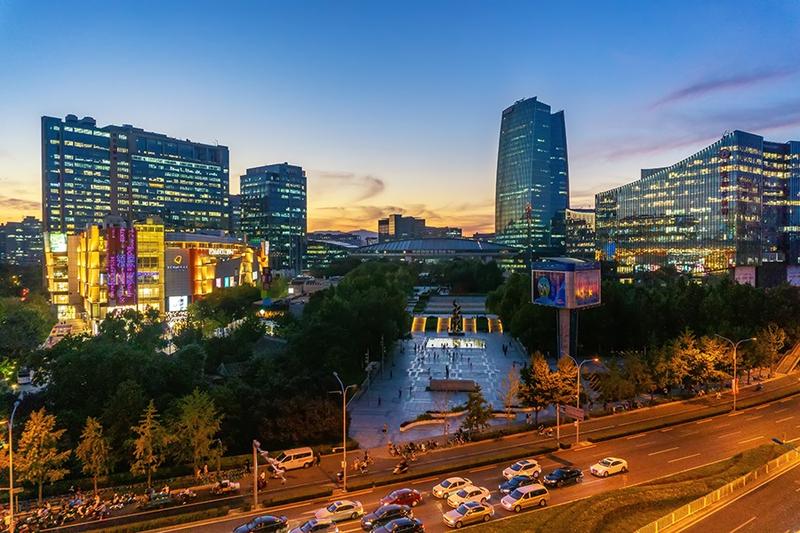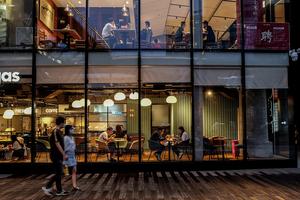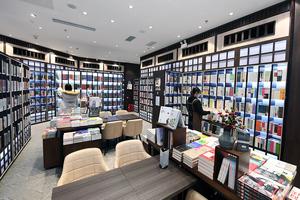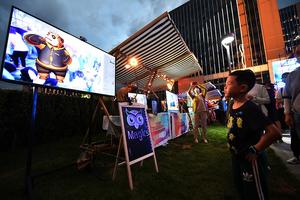Zhongguancun tech hub gets down to new business
 Beijing's Zhongguancun area, once a hub for electronic products, has become a center for high-end industries. (PHOTO PROVIDED TO CHINA DAILY)
Beijing's Zhongguancun area, once a hub for electronic products, has become a center for high-end industries. (PHOTO PROVIDED TO CHINA DAILY)
For the past 20 years Chen Hongwei, 55, has gained a wealth of experience working in China's "Silicon Valley".
He believes the Zhongguancun technology hub in northwestern Beijing, where he has witnessed rapid development, belongs to the entire world, not just to the nation's capital or China as a whole.
However, unlike the majority of those living and working in the area in Haidian district, Chen is neither a software engineer nor the founder of a high-tech company.
It’s natural to change with the times... Zhongguancun is the place for scientists from all over the world to make their dreams come true
Chen Hongwei, administrative officer for the Haidian district government
He works as an administrative officer for the government, overseeing business in a key street in Zhongguancun.
"I came to Zhongguancun in April 2000, when there were few tall buildings in the area and most people traveled by bicycle," he said.
After graduating with a major in water supply and drainage engineering from Lanzhou Jiaotong University in Gansu province in 1985, Chen landed a job as a construction project manager in Wangfujing, the commercial center of Beijing at the time and still a major shopping area.
In search of a better and more exciting career, he applied for posts with the Haidian district government in 1999, and after passing an examination and interview, became chief engineer of China (Haidian) Book Plaza in 2000.
"I experienced the peak time at the book plaza, with a daily flow of about 100,000 customers from 2000 to 2003," he said.
Being close to a number of higher education institutions, including Tsinghua and Peking universities, and scientific research establishments, the plaza in Zhongguancun was always crowded with students, teachers and intellectuals looking for books or electronic products.
Several book malls established in "Bookstore Street" in Zhongguancun attracted a large number of customers, many of whom stayed in the street for an entire day to select the books they wanted.
"However, after China joined the World Trade Organization in 2001 and bookstores started to mushroom throughout Beijing, the popularity of the book plaza in Zhongguancun started to wane," Chen said.
 Restaurants have replaced crowded markets selling digital products in Zhongguancun. (PHOTO PROVIDED TO CHINA DAILY)
Restaurants have replaced crowded markets selling digital products in Zhongguancun. (PHOTO PROVIDED TO CHINA DAILY)
Another reason for the shrinking market at the plaza was the growing online book retail market established by e-commerce giants such as Amazon and Dangdang.
"At the busiest time in 2003, we had to wait half an hour for service at a restaurant at lunchtime because there was always a long line due to the popularity of the bookstores," Chen said. "However, in 2006, daily customer flow dropped to about 5,000."
Responding to the change in business direction, Chen, who had become deputy head of the street's management bureau, led a team attempting to turn the location into a bar area.
"However, it took less than a year for us to realize we were going in the wrong direction. The bar street plan was a failure," he said.
In 2012, the district government said the street should focus on providing services for startups, as Haidian had cultivated many high-tech companies and was attracting increasing amounts of capital from Chinese and overseas investors.
"As a result, we introduced many cafes to the street because investors and young entrepreneurs like to discuss their business plans in such venues. This plan soon proved to be a success," Chen said.
In June 2014, the street was renamed Innoway and officially opened to the public. The aim was to offer a platform for open exchanges between global players in the field of innovation.
On May 7, 2015, the street became known to a wider audience when Premier Li Keqiang walked into a cafe in the area and ordered a cup of coffee.
He sat down in the cafe and talked with young people eager to start their own businesses.
In the following years, forums and other activities were staged in the street to attract talent and capital.
According to Innoway's website, in the past six years the area has incubated 3,841 startups and raised a total of 77 billion yuan (US$11.28 billion).
Chen said it is not difficult to embrace change.
"It's natural to change with the times. Twenty years ago, living conditions and facilities in Zhonggauncun were poor and lagged far behind other areas. The tallest building in the area only had four floors," he said.
Now, Zhongguancun is home to numerous modern buildings and facilities thanks to its role as Beijing's science and technology hub.
Even the public bathrooms are smart and high-tech, Chen said, adding: "Transformation is inevitable. We should grow with the times."
 A Zhongshuge Bookstore outlet opens in the area, catering to online and offline business. (REN CHAO / XINHUA)
A Zhongshuge Bookstore outlet opens in the area, catering to online and offline business. (REN CHAO / XINHUA)
Closure notice
In late August, a notice posted in Ding Hao Mall in Zhongguancun, home to outlets selling electronic devices, drew widespread attention.
It stated that the authorities had ordered the mall-which opened in 2003-to close in October for renovation and upgrading work.
One thing now seems certain-the mall will no longer be the place to go for computers, cellphones and other electronic products.
Lin Lei, a software engineer for a company in Zhongguancun, said: "It sounds like the end of an era to me. I studied at Beijing Jiaotong University, which is not too far from Zhongguancun, where I bought my first computer in 2004 when I was a freshman."
In recent years, two other major electronics markets in Zhongguancun have been closed and transformed into offices for high-tech companies.
In the early 2000s, it was hard to find anyone in their 20s and 30s who had not visited Zhongguancun.
Housing several spacious malls selling computers, related accessories, cellphones and other electronic products, the area was widely known throughout northern China, not just in Beijing.
Nearly every student went to Zhongguancun at least once during their college years to buy a laptop or a phone. Office workers went to the area for DVDs, printers and screens.
Lin said: "The cellphone market at the Ding Hao Mall covered an entire floor. You could find any brand of phone-some you knew and some you had never heard of. Prices were low."
Gao Yong, a businessman who used to sell phones at the mall, said he rented a small counter there in 2008.
"You never needed to worry about a lack of customers. It was always crowded and I sold dozens of phones every day," he said.
However, as time passed, problems arose-fraud being the most serious, followed by fake products.
Liu Qiangdong, the founder of e-commerce giant JD, which began life by operating from a 4-square-meter office in Zhongguancun in 1998, said earlier that he saw widespread cheating at the time.
He started selling electronic products online with "transparent prices" and full after-sales service, attracting an increasing number of customers over the years.
Few suspected the cramped office would produce one of the key players to change the electronic retail industry.
In 2009, the authorities in Haidian announced a plan to transform Zhongguancun into a hub for highend industries. Markets selling electronic products were discouraged in the area.
Two years later, policies were introduced to increase office space for high-end businesses, including those in the science and technology and financial services sectors.
In 2015, the authorities announced that the plan to transform Zhongguancun would be completed in three to five years, meaning that electronic products would no longer be sold at the location by the end of this year.
The closure of Ding Hao Mall is part of this plan.
 Visitors have fun at a science and technology fair in the area early this month. (PHOTO PROVIDED TO CHINA DAILY)
Visitors have fun at a science and technology fair in the area early this month. (PHOTO PROVIDED TO CHINA DAILY)
Embracing the future
Chen, the administrative officer, said: "In my view, it's not the end, regardless of the closure of the book mall or electronics markets. It's a new beginning. New industry clusters will emerge."
Ten such clusters have been formed in Zhongguancun since 2017, including those for information technology, smart devices, new materials, software information and scientific technology services.
Innovation and technology are the "inevitable development trend "in the area, Chen said.
According to the Beijing municipal government, last year Zhongguancuan was home to 74 unicorn companies-startups valued at US$1 billion or more that have yet to go public-accounting for some 92 percent of the total in Beijing.
Unicorn companies in the capital comprise about 50 percent of the total in China, highlighting the city's role as the nation's science and technology center.
Zhongguancun has become the engine for scientific and technological innovation in Beijing.
Zhao Changshan, chairman of Zhongguancun Development Group, announced at the recently held Zhongguancun Forum that the group has a 30 billion yuan "fund of funds" plan aimed at incubating high-end industry, unicorn companies and establishing science and technology services platforms.
"The 'fund of funds' will help companies in Zhongguancun launch overseas businesses, outbound mergers and acquisitions and overseas listings. A global innovation network will be formed," Zhao said.
Chen, the official, added, "Zhongguancun is the place for scientists from all over the world to make their dreams come true."


